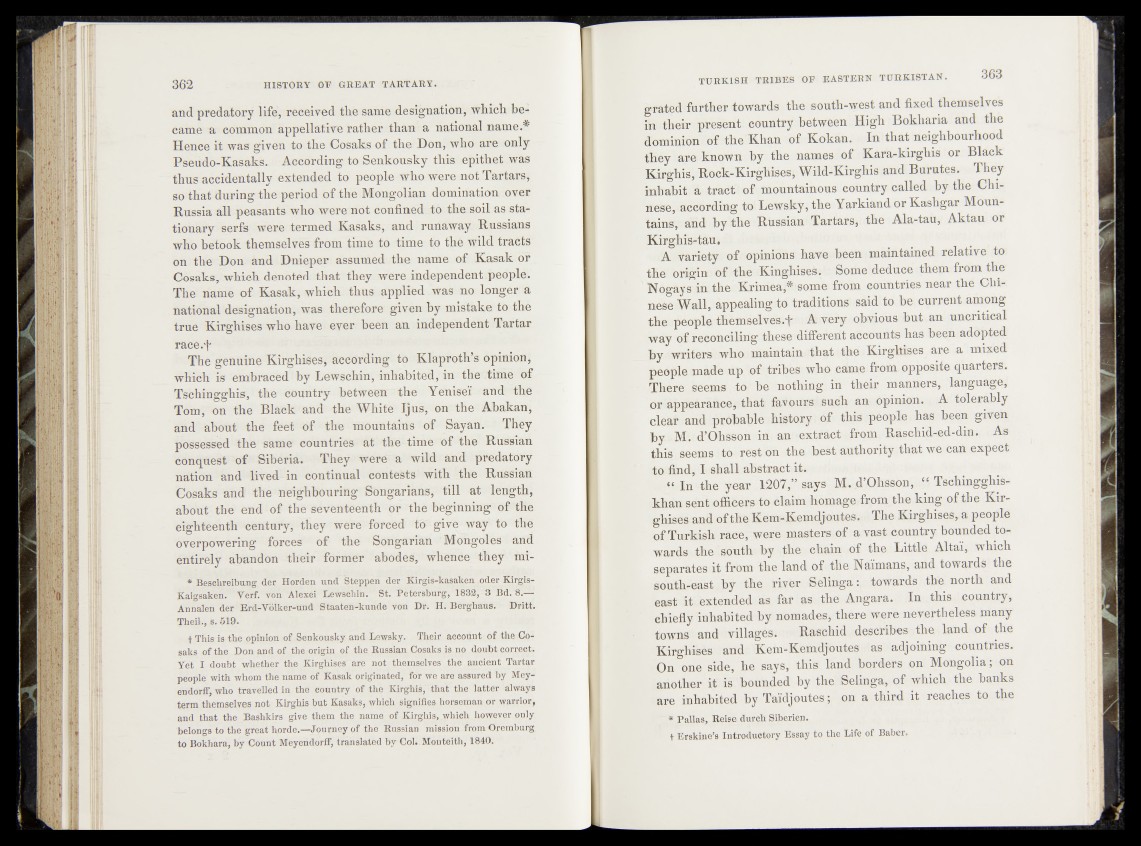
and predatory life, received the same designation, which became
a common appellative rather than a national name.*
Hence it was given to the Cosaks of the Don, who are only
Pseudo-Kasaks. According to Senkousky this epithet was
thus accidentally extended to people who were not Tartars,
so that during the period of the Mongolian domination, over
Russia all peasants who were not confined, to the-soil as stationary
serfs were termed Kasaks, and runaway Russians
who betook themselves from time to time to the wild tracts'
on the Don and Dnieper assumed the name of Kasak or
Cosaks,-which denoted that they were independent people.
The name of Kasak, which thus applied was no longer a
national designation, was therefore given by mistake to the
true Kirghises who have ever been an independent Tartar
racé-T
The genuine Kirghises, according to Klaproth’s opinion,
which is embraced by Lewschin, inhabited, in the .time of
Tschingghis, the country between th ë^Yeniser and the
Tom, on the Black and the White Ijus, on the Abakan,
and about the feet of the mountains of Sayan.. They,
possessed the same countries at the time of the Russian
conquest of Siberia, They Were a wild and predatory
nation and lived in continual contests with the Russian
Cosaks and the neighbouring Songarians, till at length,
about the end of the seventeenth or the beginning ©Mile
eighteenth century, they were forced ÏS’ give way to the
overpowering forces of the Songarian 'Mongoles and
entirely abandon their former abodes, whence they ini-
* Besehreibung der Horden und Steppen der Kirgis-kasaken .oder Kiifgis-
Kaigsakcn. Verf. von Alexèi Lewschin. St. Petersburg, 1832, 3 Bd. 8.—
Annalen der Erd-Völker-und Staaten-kunde von Dr. fi. Berghaüs. Dritt.
Thett., s. 519.
t This is the opinion of Senkousky and Lewsky. Their account of the Cq-
saks of the Don and of the origin,of the Russian Cosaks is no doubt correct.
Yet" I doubt whether the Kirghises are not themselves the ancient Tartar
people with whom the name of Kasak originated, for we are assured by Mey-
endorff, who travelled in the country of the Kirghis,” that the latter always
term themselves not Kirghis but Kasaks, which signifies horseman or warrior,
and that the Bashkirs give them the name of Kirghis, which however only
belongs to the great hprde.—Journey of the Russian mission JYom Ofemburg.
to Bokhara, by Count Meyeridorff, translated by Col.-Monteith, 1840.
grated further towards the south-west and fixed themselves
in their present country between High Bokliaria and the
dominion of the Khan of Kokan. In that neighbourhood
they are known by the names of Kara-kirghis or Black
Kirghis, Rock-Kirghises* Wild-Kirghis and Burutes. They
inhabit a tract of mountainous country called by the Chinese,
according to Lewsky, the Yarkiand or Kashgar Mountains,
and by the Russian Tartars, the Ala-tau, Aktau or
Kirghis-tau.
A variety of opinions have been. maintained relative to;
the origin of the Kinghises, • Some deduce them from the
’ Nógays in the Krimea,# some from countries near the Chinese
Wall, appealing to traditions- said to be current among
the people them selves, f A very obvious but an uncritical
way of reconciling these'different accounts has been addptecl
|jy writers who maintain .-that the Kirghises are a mixed
people made up of tribes who came from opposite quarters.
There iseems to’ be nóthingjin their manners, language,
or appearance, that favours such an opinion. .A tolerably
clear and probable history, of this:people has been given
by . M. d’Ohsson in an -extraet from Raschid-ed-din.. As
this. seems >to Test on the .best authority .that we can expect
to find, I shall abstractófe; v Mi * |
P«? In the year 1207,” says M. .d’Ohsson, .“ Tschingghis-
khan sent officers to claim homage froin the king of the Kirghises
and of the Kem^Kemdjoiites. The Kirghises,. a people
of Turkish race, were masters of a vast : country bounded towards
the south by -the cbain of the Little Altai, which
separates it from the land of the Naïmans, and towards the
south-east .by the rlvfer Selingatowards the: north and
east it extended as far as the Angara. In this country,
chiefly inhabited b y nomades, there weré nevertheless many
towns and villages. Rasöhid .fieseÉbes- .the; InDd of the
Kirghises and Ketn^Kemdjoutes as ad|oining countries.
On one side, he says, this, land borders om Mongolia; on
another it is. bounded by the. 6elingav of .which the hanks
are inhabited by TaidjoutesjjJf on a third it reaches to the
* Pallas, Raise durcb S^berieji.
t Erskine’s Introductory Essay to the Life of Baber.